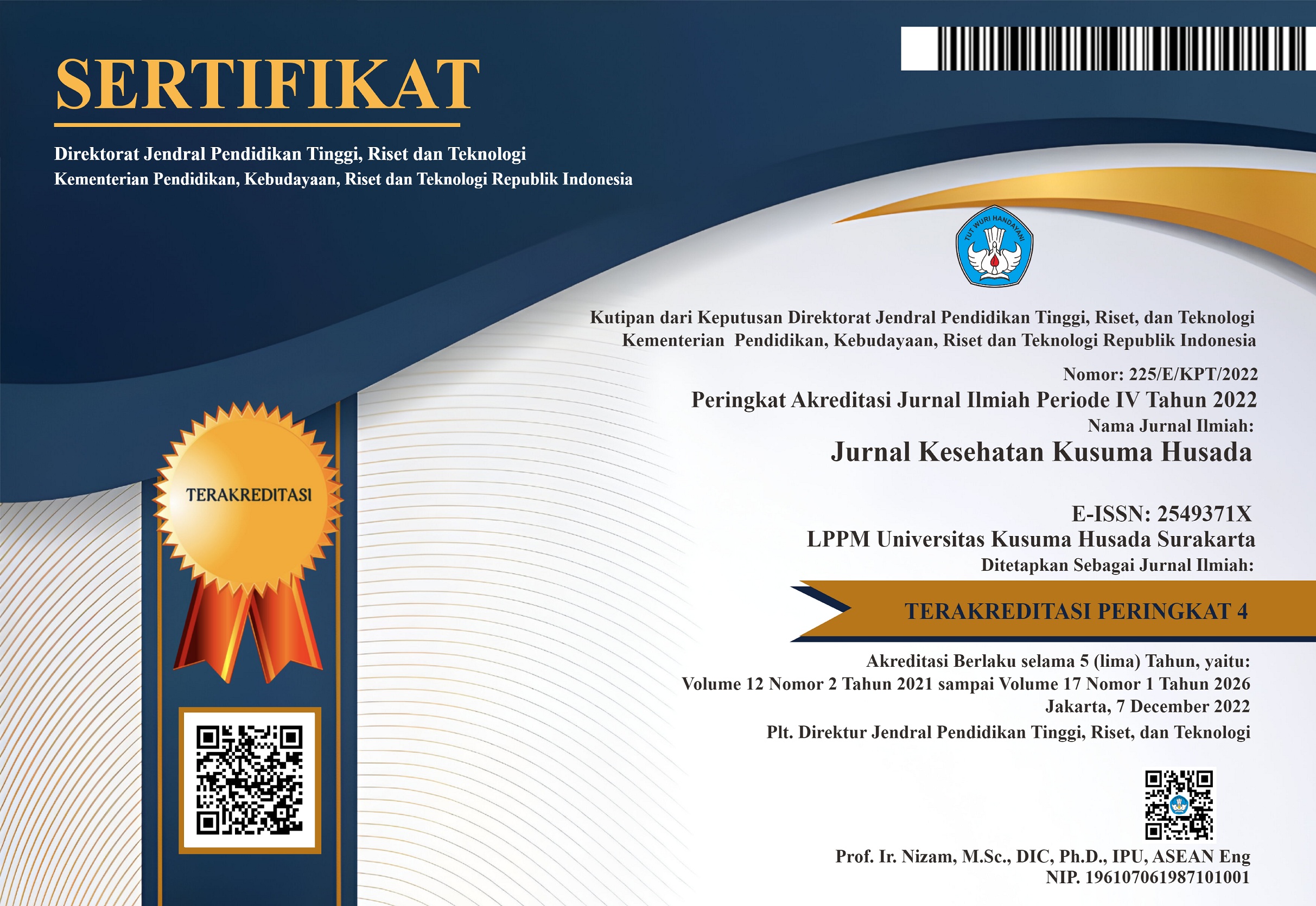HUBUNGAN STATUS GIZI DAN KUALITAS TIDUR DENGAN SIKLUS MENSTRUASI PADA REMAJA PUTRI DI PESANTREN PERKAMPUNGAN MINANGKABAU YAYASAN SHINE AL FALAH PADANG
DOI:
https://doi.org/10.34035/jk.v15i1.1212Keywords:
Kualitas Tidur, Siklus Menstruasi, Status Gizi, Sleep Quality, Menstrual Cycle, Nutritional StatusAbstract
Menstruasi merupakan tanda organ reproduksi perempuan telah matang, namun masih banyak remaja yang tidak teratur siklus haidnya. Ketidakteraturan haid menjadi pertanda permasalahan dalam tubuh. Penyebabnya yakni rendahnya status gizi, buruknya kualitas tidur, stress, kurangnya aktifitas fisik dan usia menarche lambat. Pada usia sekolah, sebagian orang tua menginginkan anaknya mendapat pendidikan di pesantren, namun di sisi lain, kesederhanaan kehidupan dipesantren dapat mempengaruhi kesehatan reproduksi remaja. Tujuan penelitian ini adalah mengetahui hubungan status gizi dan kualitas tidur dengan siklus menstruasi remaja putri di Pesantren Perkampungan Minangkabau Yayasan Shine Al-Falah Padang. Penelitian ini menggunakan metode analitik dengan desain cross sectional. Populasi penelitian ini adalah remaja putri di Pesantren Perkampungan Minangkabau Yayasan Shine Al-Falah Padang yang telah mengalami haid minimal 1 tahun. Sampel dipilih menggunakan teknik purposive sampling dengan jumlah sebanyak 74 orang. Peneliti menggunakan format pengumpulan data penilaian status gizi dan siklus haid, serta kuesioner PQSI untuk menilai kualitas tidur. Hasil penelitian diolah dengan menggunakan uji statistik Chi-square, dengan hasil sebanyak 62% responden memiliki status gizi underweight, 69% responden memiliki kualitas tidur baik, 66% responden memiliki siklus menstruasi normal, terdapat hubungan status gizi dengan siklus menstruasi (p value 0,004, p value < 0,05), terdapat hubungan kualitas tidur dengan siklus menstruasi (p value 0,000, p value < 0,05). Diharapkan pihak pengelola pesantren mengatur kegiatan pesantren dengan tetap memperhatikan jam tidur malam, dan bekerjasama dengan puskesmas dalam pemeriksaan siklus menstruasi siswi serta menindaklanjuti siklus menstruasi remaja yang tidak normal.
Menstruation is a sign that a woman's reproductive organs have matured, but there are still many teenagers whose menstrual cycles are irregular. Menstrual irregularities can be a sign of problems in the body. The causes are poor nutritional status, poor sleep quality, stress, lack of physical activity and late menarche. At school age, some parents want their children to receive an education at a boarding school, but on the other hand, the simplicity of boarding school life can affect teenagers' reproductive health. The aim of this research is to determine the relationship between nutritional status and sleep quality with the menstrual cycle in adolescent girls at the Minangkabau Village Islamic Boarding School, Shine Al-Falah Foundation, Padang. This research uses analytical methods with a cross sectional design. The population of this study were young women at the Shine Al-Falah Foundation Padang Minangkabau Village Islamic Boarding School who had experienced menstruation for at least 1 year. The sample was selected using a purposive sampling technique with a total of 74 people. Researchers used questionnaires, namely assessing nutritional status (BMI), sleep quality (PSQI questionnaire) and menstrual cycle. The research results were processed using the Chi-square statistical test, with the results that 62% of respondents had underweight nutritional status, 69% of respondents had good sleep quality, 66% of respondents had normal menstrual cycles, there was a relationship with nutritional status with the menstrual cycle (p value 0.004, p value < 0.05), there is a relationship between sleep quality and the menstrual cycle (p value 0.000, p value < 0.05). It is hoped that Islamic boarding school management will organize Islamic boarding school activities while still paying attention to nighttime sleeping hours, and collaborate with community health centers in checking female students' menstrual cycles and following up on abnormal teenage menstrual cycles.
References
Downloads
Published
Issue
Section
License
Copyright (c) 2024 Jurnal Kesehatan Kusuma Husada

This work is licensed under a Creative Commons Attribution 4.0 International License.
The copyright of the published articles belongs to Jurnal Kesehatan Kusuma Husada.

This work is licensed under a Creative Commons Attribution 4.0 International License.
















